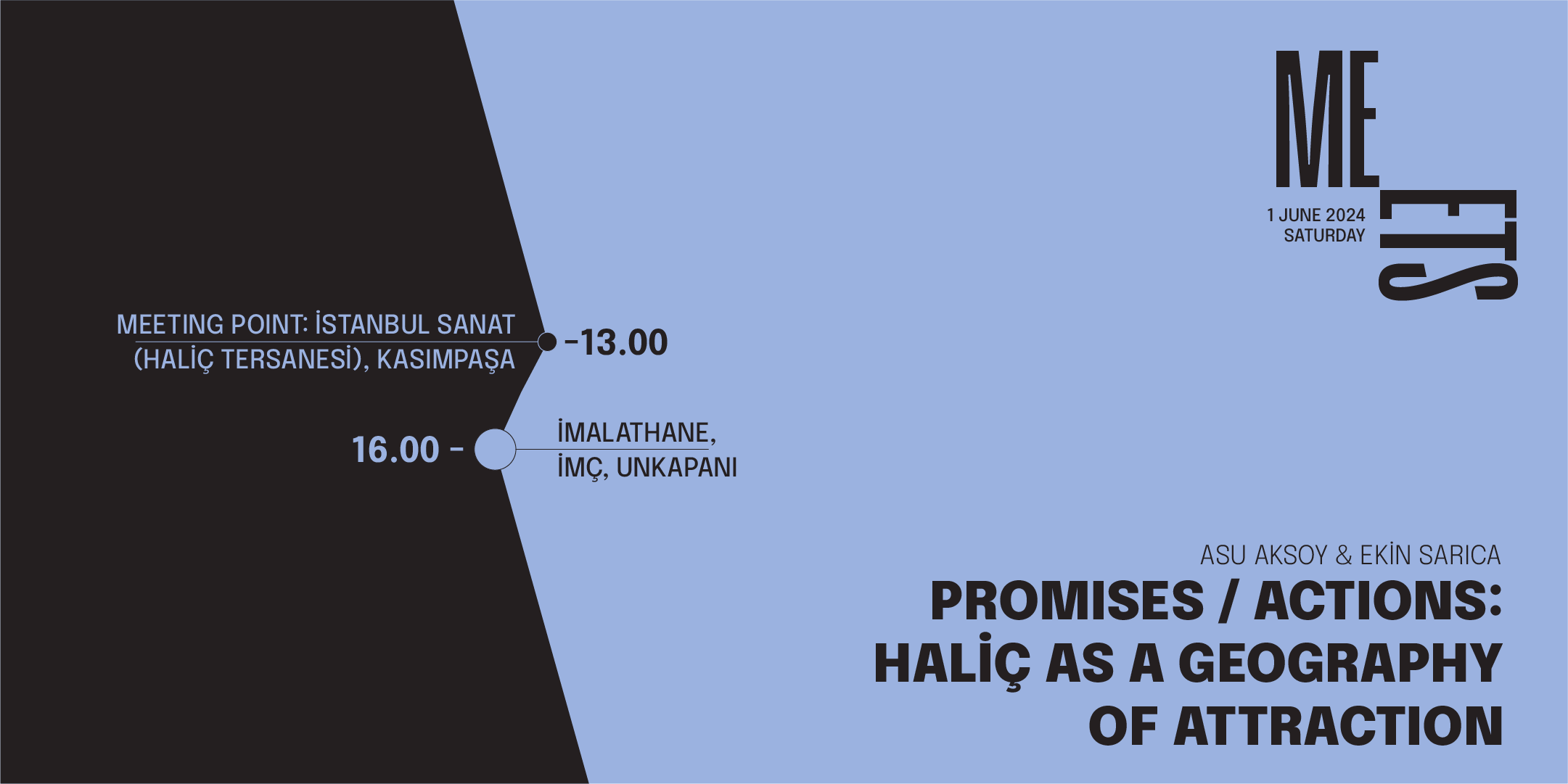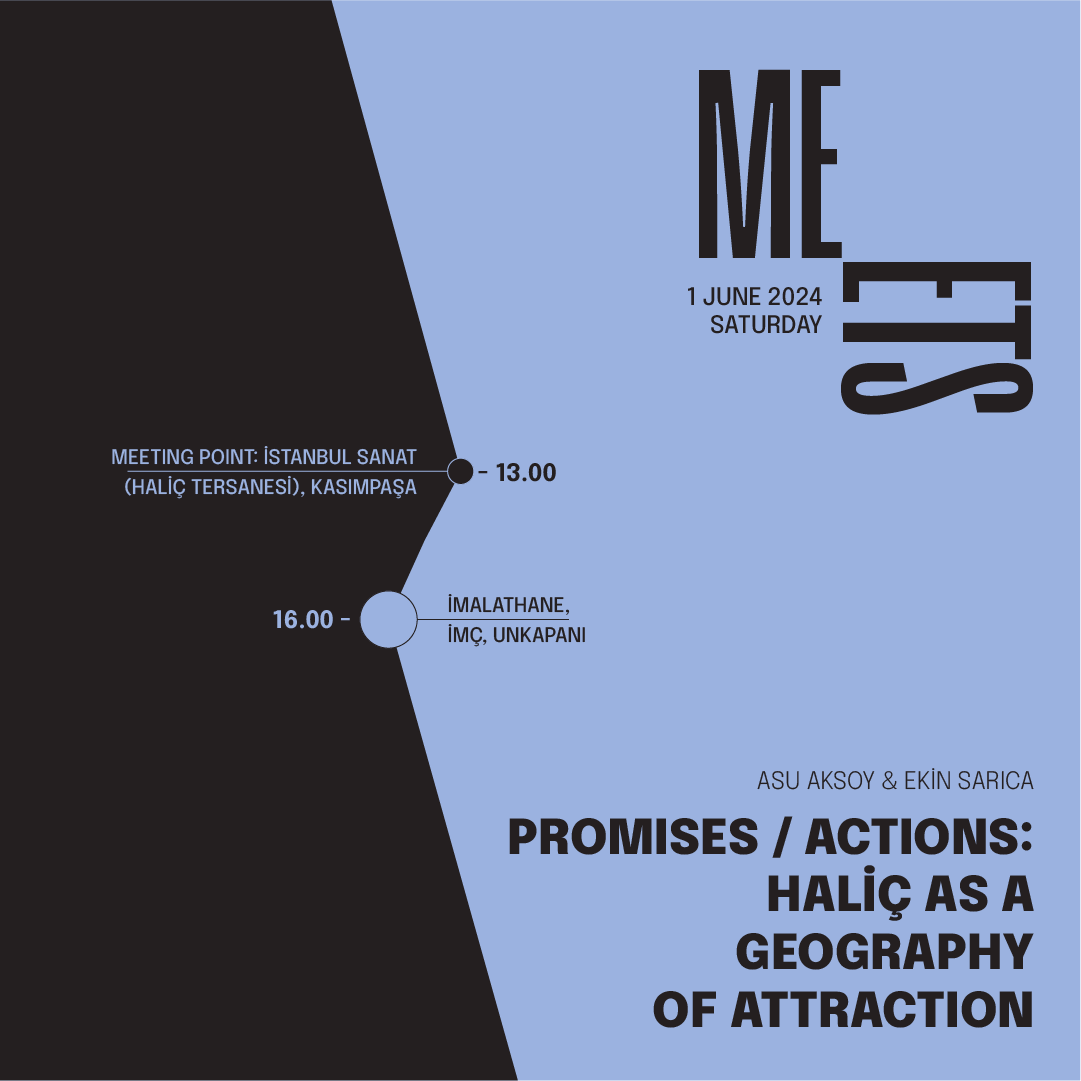

PROMISES / ACTIONS: HALİÇ AS A GEOGRAPHY OF ATTRACTION
ASU AKSOY & EKİN SARICA
1 June 2024 Saturday
- Meets
13:00 – TOUR OF HALİÇ WITH CONVERSATIONS
Touring Haliç with Ekin Sarıca and Asu Aksoy, we will be discussing the stakeholders and actors involved in the transformation of the region.
Meeting Point:
İstanbul Sanat (Haliç Tersanesi)
16:00 – PRESENTATIONS AND DISCUSSION
WHAT DO DEAD FISH SAY?
Asu Aksoy
CULTURE AS A FIELD OF ALLIANCE BETWEEN THE PUBLIC AND PRIVATE IN THE TRANSFORMATION OF HALİÇ SHIPYARDS
Ekin Sarıca
Venue:
İmalathane @ İMÇ
In a time when hegemonic struggles on both national and international scales are being more overtly represented through the cultural field, instrumentalization of culture becomes more and more evident. How prevalent this tendency in Turkey is, has been demonstrated by the 2024 municipal elections, when cultural production was instrumentalized for service-centered political populism and urban land rent. Promises pertaining to the cultural industries multiplied during this election period, particularly in large metropolitan areas. One of the prominent promises of local governments was the transformation of urban heritage buildings into cultural, touristic and recreational areas. Such promises and actions, on the one hand, garnered the consent of cultural producers and consumers while provoking their expectations for the future. On the other hand, they attract criticism from others, who regard urban heritage as more than just a matter of material preservation or economic restoration driven by tourism.
This meeting, conceived by Eda Hisarlıoğlu ve Fırat Genç for KIRIK, aims to discuss the historical and spatial consequences of turning the Haliç basin into a center of attraction. Today, this area is an axis of cultural industries with the convergence of intervention by local governments, capital and state. The holistic view that sees Haliç as a “cultural basin” and the fragmented perception of space created by the daily transportation axes used by urban residents create a multi-layered Haliç geography. We welcome you for a tour of Haliç, to assess and discuss this multi-layered geography with Asu Aksoy and Ekin Sarıca.
Asu Aksoy graduated from METU Economics Department and received her PhD in Communication Studies from the University of Westminster in 1993. She taught at İstanbul Bilgi University’s Arts and Cultural Management Programme and worked on the establishment of the Santralistanbul project. For a period of time, Aksoy was the director of the Cultural Policy and Management Research Centre established within the same university and was one of the executors of the project titled İstanbul Cultural Heritage and Cultural Economy Inventory with the support of İstanbul 2010 European Capital of Culture Agency. She was the local curator of the İstanbul project, one of the working cities of the 2012 International Architecture Biennial in Rotterdam. Her work focuses on planning and management of cities with a focus on cultural development and heritage, preservation of historical and natural heritage assets and bringing them together with the public. One of the editors of Cultural Heritage Management: Why and How? Experiences and Discussions from Turkey, Aksoy also co-hosts the radio program Cultural Heritage and Conservation: For Whom and For What? at Açık Radyo.
Ekin Sarıca graduated from Kocaeli University, Faculty of Architecture and Design. She is currently a master student at Mimar Sinan Fine Arts University, Department of Urban and Regional Planning, Urban Design program. Member of professional organizations such as The Solidarity Movement in Architecture and The Assembly of Paid and Unemployed Architects as well as collective urban struggle forums like Istanbul Urban Defence and Haliç [Golden Horn] Solidarity, Sarıca is also part of the collective behind the documentary film Haliç: Living Producing Transforming, dealing with the transformation of Beyoğlu and Haliç.
Eda Hisarlıoğlu is currently working at Goethe-Institut Istanbul as the project coordinator of Spaces of Culture. She is a part of the Amsterdam-based platform Failed Architecture’s core editorial team while completing her master degree at Kadir Has University at the Architectural and Urban Studies Program. Hisarlıoğlu has a background in architecture from İstanbul Technical University and completed the 9-month training of Open Dialogue in curatorial studies. Since 2016, she has been working in the field of arts and culture, taking on different roles, such as researcher and exhibition producer and collaborating with several institutions and artists.
Fırat Genç is assistant professor at the Department of Sociology in İstanbul Bilgi University, Turkey. He holds a PhD in History of Modern Turkey from Boğaziçi University. Genç’s books published in Turkish are Turkey of Cities: Prospects, Limits and Conflicts (with Çağlar Keyder, Fuat Keyman and Ayşe Köse Badur; İletişim, 2021) and Indivisible Unity of the Nation: Nationalisms that Shatter in the Process of Democratization (with Ferhat Kentel and Meltem Ahıska; TESEV, 2007); and the co-edited volume Property and Commons: The Making and Unmaking of Private Property in Turkey (with Begüm Özden Fırat; Metis, 2023). His research focuses on urban studies, spatial politics, social movements, Kurdish issue, nationalism, and international migration.
Part of a program on culture wars and cultural hegemony.
We thank İmalathane for providing the venue, İMÇ 5533 (Can Küçük) and SAHA Studio for their help.
KIRIK’s 2023/24 programs are supported by the SAHA Sustainability Fund.